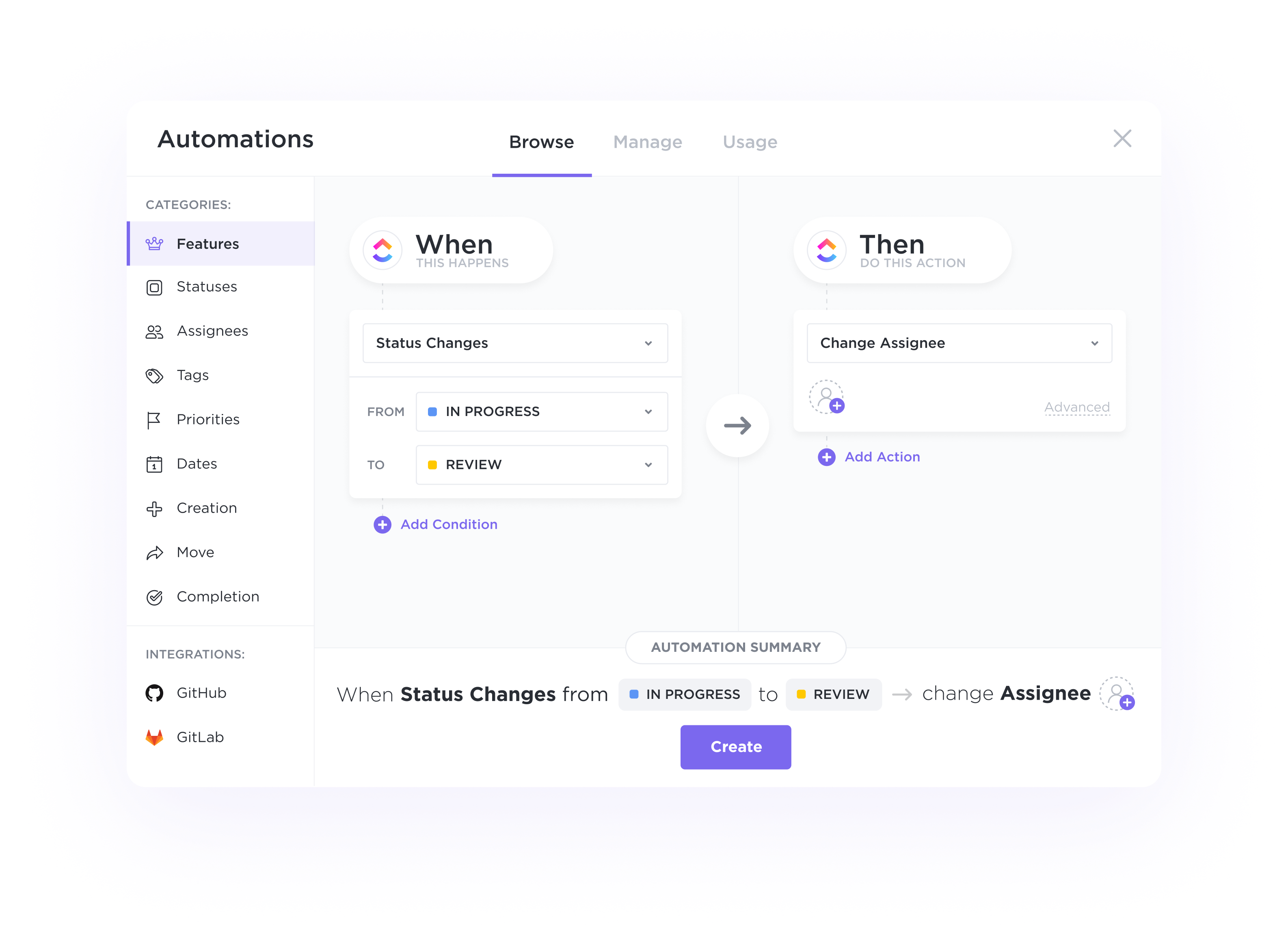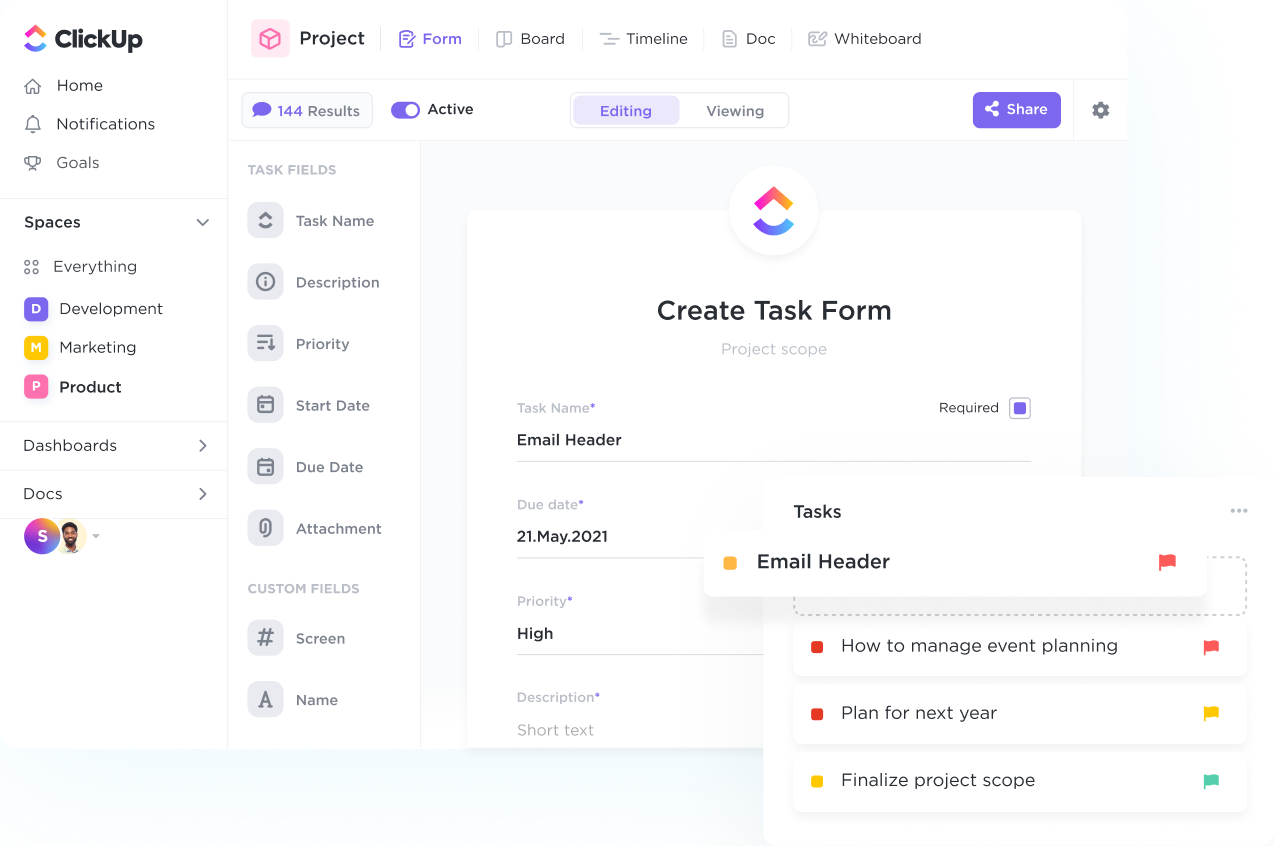Automations
Automate handoffs, status updates, and more.
Automatically assign tasks for each stage of your pipeline, trigger status updates based on activity, and switch priorities to alert your team on where to focus next.

Gantt Charts
Revolutionize your recruitment process with a customized CRM system powered by ClickUp. Streamline candidate management, optimize communication, and track progress effortlessly. Elevate your recruiting game with the ultimate CRM solution designed specifically for recruiters.
Free forever. No credit card.
Automations
Automatically assign tasks for each stage of your pipeline, trigger status updates based on activity, and switch priorities to alert your team on where to focus next.

Forms
Streamline your intake process, organize response data, and automatically create tasks with custom branded Forms powered by conditional logic.

Centralized Candidate Database: Maintain a centralized database of candidate information including resumes, contact details, and interview notes, ensuring all team members have access to up-to-date information.
Candidate Interaction Tracking: Log every interaction with candidates, from initial outreach to final decisions, providing a comprehensive view of the candidate journey and improving communication within the team.
Candidate Relationship Management: Identify and nurture relationships with top candidates, ensuring personalized and targeted communication to enhance the candidate experience and improve retention rates.
Job Posting Management: Easily create, post, and manage job listings across multiple platforms, tracking which channels generate the most qualified applicants.
Application Tracking System (ATS): Streamline the application process by automatically tracking and organizing incoming resumes, scheduling interviews, and sending automated responses to applicants.
Candidate Screening and Evaluation: Use CRM tools to screen candidates based on predefined criteria, assign scores, and track their progress through the hiring process, improving efficiency and ensuring no qualified candidate is overlooked.
Interview Scheduling Automation: Automate the scheduling of interviews, sending reminders to both candidates and interviewers, reducing scheduling conflicts and improving the overall candidate experience.
Feedback Collection and Collaboration: Collect feedback from interviewers in a centralized system, allowing for collaboration on candidate evaluations, leading to more informed hiring decisions.
Performance Analytics: Utilize data from interview feedback to analyze the effectiveness of the hiring process, identify areas for improvement, and make data-driven decisions to optimize recruitment strategies.
Onboarding Automation: Automate onboarding processes such as sending welcome emails, sharing company policies, and assigning training materials to new hires, ensuring a smooth transition and positive candidate experience.
Candidate Feedback Surveys: Gather feedback from new hires about their onboarding experience, identifying areas for improvement and ensuring a positive first impression of the company.
Retention Strategies: Use CRM data to identify trends in successful onboarding experiences and implement retention strategies to increase employee satisfaction and reduce turnover.
Recruitment Performance Metrics: Track and analyze key recruitment metrics such as time to fill, cost per hire, and source of hire, enabling recruiters to optimize their strategies and demonstrate ROI to stakeholders.
Talent Pool Analysis: Analyze the quality and diversity of candidates in the talent pool, identifying areas for improvement in sourcing strategies and ensuring a strong pipeline of talent for future hiring needs.
Compliance Reporting: Generate reports to ensure compliance with hiring regulations and diversity initiatives, providing transparency and accountability in recruitment practices.
A CRM provides a centralized platform to store candidate details, resumes, communication history, interview feedback, and more. This solves the challenge of scattered candidate information across emails, spreadsheets, and different systems, making it easy for recruiters to access and update information.
CRMs can automate sourcing by integrating with job boards, social media platforms, and websites to capture candidate information. They also streamline the tracking of candidate progress through the recruitment pipeline, from application to onboarding, reducing manual data entry and ensuring a smooth process.
CRM software enables personalized communication with candidates through email templates, scheduling tools, and automated reminders. This ensures timely follow-ups, improves candidate experience, and helps build stronger relationships with potential hires.
Recruitment teams often work on multiple roles simultaneously. A CRM fosters better team collaboration by providing visibility into each recruiter's activities, candidate interactions, and hiring status. This promotes coordination, prevents duplication of efforts, and ensures a seamless recruitment process.
CRMs offer reporting and analytics features that track essential recruitment metrics such as time-to-hire, cost-per-hire, source effectiveness, and candidate quality. These insights help recruiters evaluate their strategies, identify bottlenecks, and optimize their recruitment processes for better results.
CRM software allows recruiters to segment and nurture talent pools based on skills, experience, and interests. They can also track candidates in various stages of the hiring process, ensuring no potential hire falls through the cracks and maintaining a robust pipeline of candidates for future roles.
CRM software helps recruiters streamline candidate sourcing and tracking processes by centralizing candidate information, automating communication, tracking interactions, and providing insights for more efficient and targeted recruitment efforts.
Recruiters should look for CRM software with features like candidate management, job posting integration, resume parsing, communication tools, and reporting capabilities to streamline recruitment processes and improve candidate engagement.
Yes, CRM software can integrate with various recruitment tools and platforms to streamline the recruitment process, improve candidate management, automate workflows, and enhance communication with candidates for a more efficient and effective recruitment experience.